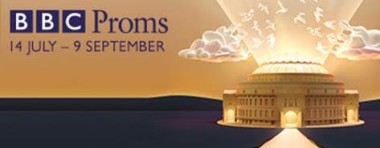
 United Kingdom 2017 BBC PROMS 69 – Adams, Dvořák, Mahler: Anne-Sophie Mutter (violin); Pittsburgh Symphony Orchestra / Manfred Honeck (conductor). Royal Albert Hall, London, 4.9.2017. (CC)
United Kingdom 2017 BBC PROMS 69 – Adams, Dvořák, Mahler: Anne-Sophie Mutter (violin); Pittsburgh Symphony Orchestra / Manfred Honeck (conductor). Royal Albert Hall, London, 4.9.2017. (CC)

(c) Chris Christodoulou
Adams – Lollapalooza (first Proms performance)
Dvořák – Violin Concerto in A minor, Op.53
Mahler – Symphony No.1 in D
Always welcome visitors, the Pittsburgh Orchestra is a virtuoso ensemble for whom two out of three pieces of this programme seem perfect: the brash, direct John Adams and the Proms favourite, Mahler’s First Symphony. The star draw came in the fine shape of Anne-Sophie Mutter, who appeared here with this orchestra and conductor in 2011 in Rihm’s Gesungene Zeit. Concentrating now more on “standard” repertoire, she brought the lovely Dvořák Concerto.
Whatever the Dvořák Concerto’s perceived failings that have prevented it achieving a firm place in the repertory, it was a masterwork in comparison with Adams’ 1995 piece Lollapalooza, a crowd-pleasing seven minutes (it felt longer) written for Sir Simon Rattle’s fortieth birthday. The rhythm of the word “lollapalooza,” with an accented and extended fourth syllable, forms the basis of what Adams himself refers to as a “dancing behemoth”. Lollapalooza is well written, the bright Pittsburgh sound and the jazzy ostinato quickly establishing a party atmosphere, the trombones and tuba on the highest tier of the orchestra and therefore able to cut through the texture without any problems. One can appreciate the tightness of ensemble of the brass and the sheer vim of the performance; but at seven minutes duration the piece was about four minutes too long.
So to the star turn, and Mutter, characteristically beautifully and elegantly dressed. Mutter was able to project the lines of the concerto beautifully into this vast space, and Honeck was the perfect accompanist, attentive to her every nuance of rubato. Basically, the orchestra stuck to her like glue. The beautiful oboe solos courtesy of Cynthia Koledo DeAlmeida were particularly worthy of mention.
Mutter was guilty of a surprising amount of tuning slips during this performance, including in the lovely second movement. No criticism is necessary of her precision in her very highest register, however, especially in that tricky opening to the finale. If only the orchestra had followed the first solo statement of the theme by really digging in when it was their turn as tutti; and Mutter could be accused of some High Germanic seriousness when Czech rusticity was the order of the day; neither was she 100% rhythmically secure throughout. On this showing it would be difficult to appreciate just how beautiful Dvořák’s concerto really is. Still, there was enough applause for an encore, this beautifully despatched: the Gigue from Bach’s D minor Partita for solo violin, BWV 1004.
And so to Mahler. A Mahler Second and Fourth this year have been notable; now it was the turn of the First in a well-controlled reading. The strings in particular at the opening (“Wie ein Naturlaut”) were a model of discipline, while the off-stage trumpets seemed perfectly placed heard from the stalls at the very back of the auditorium. Honeck’s pedigree in this music is impeccable – he was a violist with the Vienna Philharmonic in the glory years under the likes of Bernstein. Honeck’s elision into the Wunderhorn theme from “Ging heut’ Morgen” was simply lovely; interesting also how he foregrounded the trombones over the horns for the first movement’s main climax.
A big gap between movements led to a nicely swaggering second movement, with some nice string phrasing in the Trio. There was some rather laboured point-making at times from Honeck, memories of which were completely dispelled by the astonishing double-bass solo from Pittsburgh principal Jeffrey Turner at the opening of the third movement, taken at a rather rapid pace but still containing some characterful moments. The Pittsburgh sound at the Urschrei that launches the finale was decidedly brash, perhaps to maximise contrast to the incredibly tender strings for the grand, quiet plateaux this movement holds before bursting out into a horn-led cacophony of joy. The horns did stand at the end for their big statement, the very close inevitably bringing the house down.
A good Mahler First from many angles, then, but not one I would choose to revisit often. The piece does not ask for huge depth, certainly not that of the later symphonies, but one should emerge with a palpable sense of elation that derives from more than the score’s final pages, and that was not quite the case here. A couple of encores: Josef Strauss’ Die Libelle (“The Dragonfly”) and the Furioso-Polka by Johann Strauss II moved the focus away from the storm-tossed clouds of Mahler’s finale to another, gilded world of old.
Colin Clarke
For more about the BBC Proms click here.